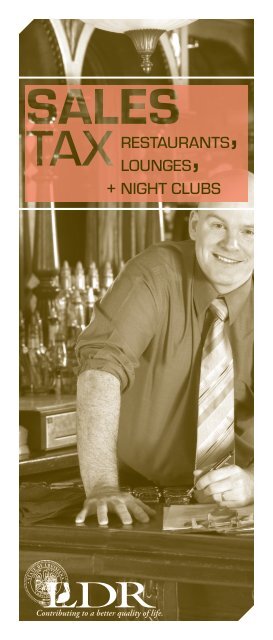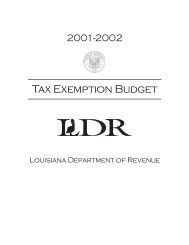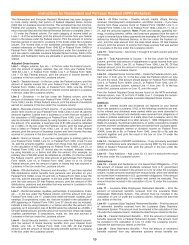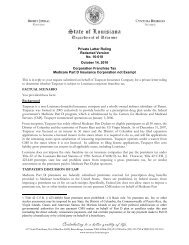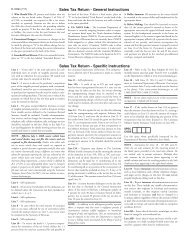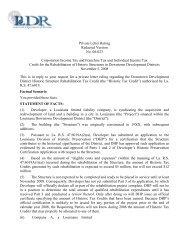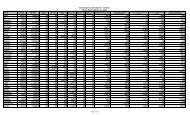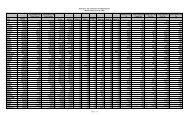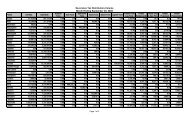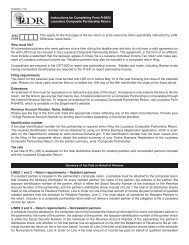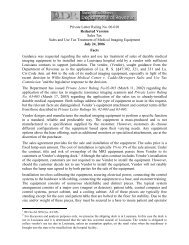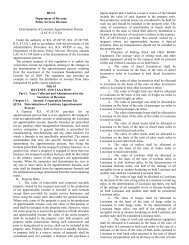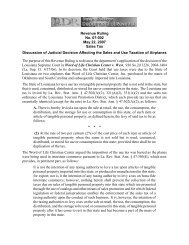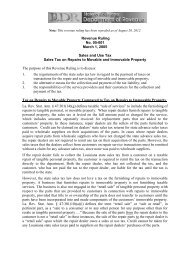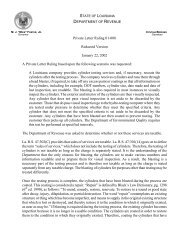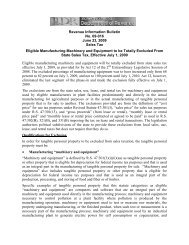R-20165 - Louisiana Department of Revenue
R-20165 - Louisiana Department of Revenue
R-20165 - Louisiana Department of Revenue
You also want an ePaper? Increase the reach of your titles
YUMPU automatically turns print PDFs into web optimized ePapers that Google loves.
Contributing to a better quality <strong>of</strong> life.
Sales tax:<br />
Restaurants, Lounges,<br />
+ Nightclubs<br />
Contents<br />
Introduction.......................................................................... 2<br />
How To Register................................................................. 2<br />
Filing Sales Tax Returns................................................... 3<br />
Closing a Sales Tax Account.......................................... 6<br />
Restaurant, Lounge, and Nightclub Sales............... 6<br />
Catering.................................................................................. 7<br />
Vending Machines............................................................. 8<br />
Door and Entertainment Charges.............................. 9<br />
Tips and Gratuities............................................................ 9<br />
Excess Tax............................................................................. 9<br />
Use Tax.................................................................................11<br />
Purchases for Resale.....................................................12<br />
Records To Be Kept........................................................13<br />
Directory..............................................................................15<br />
1
Introduction<br />
<strong>Louisiana</strong> restaurants, lounges, and nightclubs<br />
<strong>of</strong>fer some <strong>of</strong> the country’s finest cuisine and liveliest<br />
entertainment. Many excellent restaurants,<br />
some <strong>of</strong> which specialize in foods unique to this<br />
state and <strong>of</strong>fer a blend <strong>of</strong> music and entertainment<br />
found nowhere else, have given <strong>Louisiana</strong><br />
an international reputation as a gourmet’s paradise<br />
and a reveler’s haven.<br />
Restaurants, lounges, and nightclubs not only<br />
fulfill the food and entertainment needs <strong>of</strong> our<br />
citizens and visitors, but they also collect the<br />
state’s general sales tax on the sales <strong>of</strong> products<br />
and services they provide.<br />
This brochure has been prepared to familiarize<br />
owners and operators <strong>of</strong> restaurants, lounges,<br />
and nightclubs with their responsibilities as collectors<br />
<strong>of</strong> the state sales tax. The information<br />
contained in this brochure explains the owners’<br />
and operators’ responsibilities and procedures<br />
by which they can comply with their obligation to<br />
collect, account for, and remit the state sales tax.<br />
How to register<br />
Any individual, partnership, or corporation planning<br />
to open a restaurant, nightclub, or lounge in <strong>Louisiana</strong><br />
is required by law to register with the <strong>Louisiana</strong><br />
<strong>Department</strong> <strong>of</strong> <strong>Revenue</strong> (LDR) for the collection <strong>of</strong>,<br />
accounting for, and remittance <strong>of</strong> the state sales<br />
tax. This requirement can easily be satisfied by visiting<br />
LDR’s website at www.revenue.louisiana.gov and<br />
clicking the business registration link.<br />
Restaurant and lounge owners may also inquire<br />
about other state tax responsibilities, such as<br />
state corporation income, corporation franchise,<br />
and withholding taxes. Prospective restaurant,<br />
nightclub, or lounge owners should also contact<br />
their parish or municipal taxing authorities for<br />
information concerning local sales taxes, occupa-<br />
2
tional licenses, and other requirements.<br />
In addition to sales tax, food and beverage establishments<br />
in Orleans Parish and the New Orleans<br />
airport must also register for the E.N. Morial<br />
Exhibition Hall Authority Food and Beverage Tax. For<br />
more information about this tax, visit LDR’s website<br />
at www.revenue.louisiana.gov or contact LDR at<br />
(225) 219-0102.<br />
Before doing business, the owner must have a<br />
permit to serve alcoholic beverages on the premises.<br />
To obtain the appropriate permit for the<br />
business, the owner should contact the Office <strong>of</strong><br />
Alcohol and Tobacco, <strong>Louisiana</strong> <strong>Department</strong> <strong>of</strong><br />
<strong>Revenue</strong>, Post Office Box 66404, Baton Rouge,<br />
70896-6404 or call (225) 925-4041. Additional<br />
information may be found on their web site at<br />
www.atc.revenue.louisiana.gov.<br />
For more information on registration, contact<br />
LDR at (225) 219-7462 or write to:<br />
<strong>Louisiana</strong> <strong>Department</strong> <strong>of</strong> <strong>Revenue</strong><br />
P.O. Box 201<br />
Baton Rouge, LA 70821-0201<br />
Filing sales tax returns<br />
The <strong>Department</strong> <strong>of</strong> <strong>Revenue</strong> will mail the sales<br />
tax return form to the address provided through<br />
the registration process. Forms are routinely<br />
mailed by LDR to taxpayers on the 25th day <strong>of</strong><br />
the month. If the blank sales tax return form<br />
is not received by the 5th day <strong>of</strong> the following<br />
month, the taxpayer should contact LDR at (225)<br />
219-7462 or the appropriate regional <strong>of</strong>fice, to<br />
request that a second return form be mailed in<br />
order to avoid late-filing charges.<br />
3
Blank sales tax return forms can also be downloaded<br />
through LDR’s website at www.revenue.<br />
louisiana.gov.<br />
All returns for new accounts for state sales tax<br />
must be filed on a monthly basis. Once a taxpayer<br />
has filed six monthly returns, he may apply for<br />
and receive a quarterly filing status, providing<br />
the state sales tax liability averages less than<br />
$500 per month. The <strong>Department</strong> also allows a<br />
limited number <strong>of</strong> businesses to file returns on a<br />
seasonal basis. Taxpayers interested in filing on a<br />
basis other than monthly should contact LDR at<br />
(225) 219-7462.<br />
Any taxpayer whose sales tax payment exceeds<br />
$5,000 is required to make payment by Electronic<br />
Funds Transfer (EFT). Taxpayers whose<br />
payments are less than $5,000 may volunteer to<br />
pay electronically. For more information, download<br />
<strong>Louisiana</strong> Electronic Funds Transfer Guidelines,<br />
R-20201.<br />
All taxpayers are encouraged to file their sales<br />
tax returns electronically. LDR’s LaTAP program<br />
allows taxpayers to file returns, make payments,<br />
and check accounts. More information about<br />
LaTAP can be found on LDR’s web site at www.<br />
ldrtap.rev.louisiana.gov.<br />
All information pertinent to the business required<br />
by the sales tax reporting form must be included<br />
on the return. This includes information on how<br />
the tax liability was calculated, the return period,<br />
the signature <strong>of</strong> the preparer, the signature <strong>of</strong> the<br />
business owner, and the date signed. Instructions<br />
for preparing the sales tax return are included with<br />
the form. The completed return is due no later than<br />
the 20th day <strong>of</strong> the month following the close <strong>of</strong> the<br />
taxable period. If the due date falls on a weekend or<br />
holiday, the return is due the next business day and<br />
becomes delinquent the first day thereafter. For example,<br />
the July sales tax return is due by the 20th<br />
day <strong>of</strong> the following month, or August 20.<br />
4
Returns and/or payments that are received<br />
by the <strong>Department</strong> after their due date will be<br />
subject to:<br />
1. disallowance <strong>of</strong> vendor’s compensation (line<br />
10 <strong>of</strong> the return),<br />
2. interest on the tax liability from the due date<br />
until date <strong>of</strong> payment, and<br />
3. delinquent payment penalties at the rate <strong>of</strong><br />
5% <strong>of</strong> the tax for each month or portion <strong>of</strong><br />
month until the return is filed, up to an aggregate<br />
maximum (delinquent payment and<br />
delinquent filing) penalty <strong>of</strong> 25%.<br />
Taxpayers who have no taxable sales are still<br />
required to file a timely return. A restaurant or<br />
lounge owner who temporarily closes the business<br />
and is unable to file a return should contact<br />
LDR prior to the due date <strong>of</strong> the return. If the<br />
business is to be closed for an extended period<br />
<strong>of</strong> time, the sales tax account should be closed<br />
and a new application submitted when business<br />
is resumed. If the taxpayer does not file a return,<br />
the <strong>Department</strong>’s automated records system<br />
will calculate an estimated assessment based on<br />
previous returns or other information gathered<br />
by the <strong>Department</strong>.<br />
Taxpayers who fail to file proper returns or to remit<br />
the tax owed could be subject to other legal<br />
action. Examples <strong>of</strong> such failure are as follows:<br />
1. filing a fraudulent return;<br />
2. refusing to file a return; or,<br />
3. collecting taxes from customers and failing to<br />
remit these taxes to LDR.<br />
5
Legal actions that may result from failure to file a<br />
proper return are as follows:<br />
1. criminal or civil charges;<br />
2. cease-and-desist order (court-ordered closing<br />
<strong>of</strong> business);<br />
3. suspension <strong>of</strong> any and all liquor permits by the<br />
Alcoholic Beverage Control Board; and/or,<br />
4. any other legal action permitted by law.<br />
Closing a sales tax account<br />
To close a sales tax account, the taxpayer should<br />
sign the reverse side <strong>of</strong> the sales tax certificate,<br />
indicate the last day <strong>of</strong> business, and return the<br />
certificate to LDR along with a final sales tax<br />
return. The Final Return box on the back <strong>of</strong> the<br />
sales tax return should be filled in as well as the<br />
date the business was sold or terminated.<br />
Taxpayers may obtain assistance or information<br />
on filing and assessment procedures involving<br />
sales tax returns by calling (225) 219-7462, or<br />
by writing to:<br />
<strong>Louisiana</strong> <strong>Department</strong> <strong>of</strong> <strong>Revenue</strong><br />
P.O. Box 201<br />
Baton Rouge, LA 70821-0201<br />
Restaurant, lounge, and<br />
nightclub sales<br />
Meals, drinks, and other food items sold by<br />
restaurants, drive-ins, snack bars, nightclubs,<br />
lounges, private clubs, etc., are taxable regardless<br />
<strong>of</strong> whether or not the establishment provides<br />
facilities on the premises for their immediate<br />
consumption. The term facilities, when used<br />
in these situations, includes indoor and outdoor<br />
areas. Prepared food sold by vendors other than<br />
restaurants, drive-ins, etc., in such a manner that<br />
6
it is readily available for immediate consumption,<br />
is also taxable.<br />
<strong>Louisiana</strong> Revised Statute 47:305(D)(2) provides<br />
an exemption for meals furnished to the following:<br />
1. staff and students <strong>of</strong> educational institutions<br />
(including kindergartens);<br />
2. staff and patients <strong>of</strong> hospitals;<br />
3. staff, inmates, and patients <strong>of</strong> mental institutions;<br />
4. boarders <strong>of</strong> rooming houses; and,<br />
5. occasional meals furnished in connection with<br />
educational, religious, or medical organizations.<br />
In order for these establishments to keep an exempt<br />
status, the following conditions must be met:<br />
1. the meals must be consumed on the premises<br />
where purchased; and,<br />
2. the establishment cannot be open to outsiders<br />
or the general public.<br />
Items sold by restaurants intended for consumption<br />
away from the premises, such as cakes,<br />
pies, and meats, are considered taxable sales<br />
and should be included on Line 1 <strong>of</strong> the sales tax<br />
return. Sales <strong>of</strong> nonfood items by a restaurant,<br />
nightclub, or lounge, such as T-shirts, gifts, or<br />
souvenirs, are also taxable and must be included<br />
in total sales on Line 1 <strong>of</strong> the sales tax return.<br />
Catering<br />
Businesses, such as caterers, engaged in the<br />
preparation <strong>of</strong> food and drink for consumption at<br />
a location designated by the customer, and providing<br />
additional services to the customer at that<br />
location, have a responsibility to collect tax on the<br />
sales <strong>of</strong> food and drink.<br />
The charges for preparing and serving the food<br />
and drinks are not taxable when:<br />
7
1. the food is consumed at a location other than<br />
the restaurant or lounge owner’s premises; and,<br />
2. the charges for preparing and serving the food<br />
and drinks are listed separately from the price<br />
charged for the sale <strong>of</strong> the food and drinks.<br />
The entire amount <strong>of</strong> catered sales is taxable if a<br />
lump-sum price is charged for the food, preparation,<br />
and serving.<br />
Vending machines<br />
Sales <strong>of</strong> food, drinks, or other items through coinoperated<br />
vending machines are treated differently<br />
from over-the-counter sales <strong>of</strong> these items. For<br />
convenience in collecting and reporting the state<br />
sales tax, there is a special provision in the law<br />
for the treatment <strong>of</strong> sales <strong>of</strong> items made from<br />
vending machines. R.S. 47:301(10) provides that<br />
the sales tax is due when the operator purchases<br />
the goods, not when they are resold through the<br />
machines. Vending machine operators must pay<br />
state sales tax on all items sold through vending<br />
machines. Also, in the event that the wholesaler<br />
does not charge tax to the vending machine operator,<br />
the operator must accrue use tax on the<br />
cost <strong>of</strong> the purchases and remit the tax directly to<br />
LDR.<br />
8
Door and entertainment charges<br />
Many lounges, nightclubs, and bars have a practice<br />
<strong>of</strong> collecting door sales or cover charges<br />
for the privilege <strong>of</strong> admission to their establishments.<br />
<strong>Louisiana</strong> law imposes a sales tax on fees<br />
and other considerations given for access to<br />
places <strong>of</strong> entertainment or amusement. These<br />
amounts should be included on Line 3 <strong>of</strong> the<br />
sales tax return as sales <strong>of</strong> taxable services.<br />
Tips and gratuities<br />
Tips or gratuities that are freely given by a customer<br />
over and above the price charged for food<br />
or drinks are not subject to state sales tax. Any<br />
gratuity, tip, or service charge added as a separate<br />
item to the customer’s bill as a requirement<br />
<strong>of</strong> the eating establishment is not subject to the<br />
sales tax if the full amount <strong>of</strong> the service charge<br />
is disbursed directly to the employees who customarily<br />
and regularly provide the service. If any<br />
portion <strong>of</strong> the tip or gratuity is retained by the<br />
restaurant or lounge operator, then the entire<br />
amount <strong>of</strong> the gratuity becomes taxable.<br />
Excess tax<br />
R.S. 47:304(D) requires taxpayers to remit to the<br />
<strong>Department</strong> the total amount <strong>of</strong> sales tax collected<br />
when that amount exceeds the amount determined<br />
by multiplying the tax rate by taxable sales. The<br />
total tax collected during any given month <strong>of</strong>ten<br />
exceeds the tax as calculated by multiplying total<br />
gross sales by four percent. This occurs because<br />
<strong>of</strong> rounding differences for sales tax charged on<br />
individual transactions when the tax tables established<br />
by R.S. 47:304(C) are used. For example, ten<br />
individual sales <strong>of</strong> $10.93 at the seven percent tax<br />
rate will amount to $7.70 in tax collected. Yet, tax<br />
as reported will amount to only $7.65 (10 sales @<br />
$10.93 or $109.30 times seven percent tax rate),<br />
or 5¢ less than the tax collected.<br />
9
The amount by which the tax collected exceeds<br />
the amount <strong>of</strong> tax calculated on Line 7 <strong>of</strong> the<br />
state sales tax return is called excess tax and<br />
must be included on Line 8 <strong>of</strong> the state sales tax<br />
return. The excess tax amount should be prorated<br />
between the state and local sales tax returns<br />
when sales tax for both authorities is being collected<br />
on the same sales.<br />
For example:<br />
Taxable sales...........................................................$5,000<br />
Tax rate (state: 4% and local: 3%*)...................... 7%<br />
Actual tax collected..................................................$364<br />
State tax Local tax<br />
Taxable sales.............................$5,000............. $5,000<br />
Tax rate........................................... x 4%................. x 3%<br />
Tax due............................................ $200................. $150<br />
Tax collected................................................................$364<br />
Less tax calculated<br />
($200 state and $150 local)...........................(350)<br />
Excess tax collected....................................................$14<br />
State share............................................$14 x 4/7 = $8<br />
(Line 8 <strong>of</strong> state sales tax return)<br />
Local share............................................$14 x 3/7 = $6<br />
(included on local sales tax return)<br />
* This tax rate will vary from one local taxing<br />
authority to another.<br />
10
Use tax<br />
R.S. 47:302(A)(2), et seq., levies a use tax on the<br />
cost price <strong>of</strong> items <strong>of</strong> tangible personal property<br />
when the property is not sold but is used, consumed,<br />
distributed, or stored in this state for the<br />
private use <strong>of</strong> the business. Use tax is due only<br />
when the state sales tax has not been paid on the<br />
purchase <strong>of</strong> these items. Items that have not been<br />
subject to state sales tax typically might include:<br />
1. purchases from out-<strong>of</strong>-state vendors not<br />
registered to collect <strong>Louisiana</strong> tax when such<br />
purchases are delivered to the restaurant or<br />
lounge operator in this state;<br />
2. items taken from inventory for the personal<br />
use <strong>of</strong> the business on which no state sales<br />
tax has been paid; or,<br />
3. any other purchases <strong>of</strong> tangible personal property,<br />
not specifically exempt by laws, on which<br />
state sales tax was not collected by the vendor.<br />
Examples <strong>of</strong> items on which use tax would be due<br />
if the state sales tax has not been paid include<br />
the following:<br />
1. tables, chairs, and other furnishings;<br />
2. plates, utensils, napkins, etc., if reusable;<br />
3. the cost <strong>of</strong> meals and drinks when they are not<br />
sold but are given to customers, employees, etc.;<br />
4. equipment used for the storage, preparation,<br />
or distribution <strong>of</strong> food and drinks;<br />
5. lease payments for equipment and furnishings<br />
rented by the restaurant or lounge;<br />
6. repairs to equipment and furnishings; and,<br />
7. T-shirts or gifts given to customers or employees.<br />
11
Purchases For Resale<br />
Business owners may purchase items for resale<br />
in their business without payment <strong>of</strong> the state<br />
sales tax. To qualify as a purchase for resale, an<br />
item must become a component part <strong>of</strong> the finished<br />
product and add something <strong>of</strong> benefit to it.<br />
The following are some examples <strong>of</strong> resale items<br />
for restaurant, lounge, and nightclub operators:<br />
1. food<br />
2. liquor<br />
3. mixers<br />
4. s<strong>of</strong>t drinks<br />
5. nonreusable cups<br />
6. disposable napkins<br />
7. swizzle sticks<br />
8. nonreusable utensils<br />
9. condiments<br />
10. ice served in beverages<br />
11. straws<br />
12. carry-out packaging<br />
Examples <strong>of</strong> items that do not qualify:<br />
1. mops, brooms, etc.<br />
2. reusable glasses<br />
3. reusable linen<br />
4. cleaning liquids<br />
5. invoices or guest checks<br />
6. printed menus<br />
7. free advertising specialty items<br />
12
Taxpayers who are charged state sales tax on<br />
purchases <strong>of</strong> items for resale should present a<br />
copy <strong>of</strong> their <strong>Louisiana</strong> Resale Certificate (R-<br />
1055 or R-1064) to their vendor. The vendor<br />
should credit the taxpayer for the state sales tax<br />
paid in error. The <strong>Louisiana</strong> Resale Certificate is<br />
issued to all taxpayers who are engaged in the<br />
business <strong>of</strong> selling tangible personal property<br />
upon registration with LDR. Any taxpayer who<br />
does not receive a <strong>Louisiana</strong> Resale Certificate<br />
should contact LDR at (225) 219-7462 to request<br />
one.<br />
Records to be kept<br />
R.S. 47:1542.1 requires that any document or<br />
record necessary to support any tax administered<br />
by the <strong>Department</strong> be maintained by the<br />
taxpayer until the tax prescribes. These records<br />
should clearly support any and all items claimed<br />
on the return.<br />
Restaurant, lounge, and nightclub operators,<br />
like all other taxpayers, are required to keep and<br />
maintain suitable books and records that clearly<br />
show how their tax liabilities were calculated. R.S.<br />
47:309 requires dealers to “keep and preserve<br />
suitable records <strong>of</strong> sales, purchases, or leases<br />
taxable under this Chapter, and such other books<br />
<strong>of</strong> accounts as may be necessary to determine<br />
the amount <strong>of</strong> tax due.” R.S. 47:309 also provides<br />
that any taxpayer who fails to keep and maintain<br />
suitable records will be subject to a fine <strong>of</strong> up<br />
to $500 and/or up to 60 days in jail for each<br />
month that adequate records are not kept.<br />
Examples <strong>of</strong> documents and records that restaurants,<br />
lounges, and nightclubs should keep are as<br />
follows:<br />
Sales records<br />
• restaurant guest checks or sales tickets<br />
13
• daily sales register receipts or tapes<br />
• sales journal and/or general ledgers<br />
• bank deposit records<br />
• state and federal income tax returns<br />
Purchase records<br />
• purchase invoices<br />
• purchase journals and/or general ledgers<br />
that distinguish inventory purchases from<br />
expense purchases<br />
• cash disbursements journal or checkbook<br />
• depreciation schedule <strong>of</strong> fixed assets<br />
Other records<br />
• sales tax returns with supporting work papers<br />
• information on items on which use tax has<br />
been accrued<br />
These examples are for illustration only and are not<br />
to be considered as all-inclusive. The required records<br />
are to be maintained by the taxpayer for three years<br />
from the end <strong>of</strong> the year in which the taxes became<br />
due, or until such time as agreements to suspend prescription<br />
have prescribed, if the taxpayer has entered<br />
into such agreements with LDR.<br />
R.S. 47:1542 authorizes the Secretary <strong>of</strong> <strong>Revenue</strong>,<br />
or any authorized assistant, to examine or investigate<br />
the place <strong>of</strong> business and any records <strong>of</strong> a<br />
taxpayer to determine the correct tax liability. LDR’s<br />
field representatives and their supervisors are<br />
authorized assistants to the Secretary <strong>of</strong> <strong>Revenue</strong><br />
who will routinely contact businesses to examine<br />
their books and records. Rights <strong>of</strong> the Taxpayer (R-<br />
20161) is a brochure that discusses LDR audit and<br />
appeals procedures.<br />
This brochure may be downloaded at LDR’s web<br />
site at www.revenue.louisiana.gov.<br />
14
Directory<br />
Assistance is available from any <strong>of</strong> the <strong>Louisiana</strong><br />
<strong>Department</strong> <strong>of</strong> <strong>Revenue</strong>’s regional <strong>of</strong>fices located<br />
throughout the state. The addresses and telephone<br />
numbers <strong>of</strong> these <strong>of</strong>fices are listed below.<br />
Baton Rouge Headquarters<br />
Post Office Box 201<br />
Baton Rouge, LA 70821-0201<br />
617 North Third St. • Baton Rouge, LA 70802<br />
(225) 219-0102 • (225) 219-2114 (TDD)<br />
Southeast District<br />
New Orleans<br />
(504) 568-5233<br />
Thibodaux<br />
(504) 568-5233<br />
Southwest District<br />
Baton Rouge<br />
(225) 219-5500<br />
North District<br />
Alexandria<br />
(318) 487-5333<br />
Monroe<br />
(318) 362-3151<br />
Shreveport<br />
(318) 676-7505<br />
Lafayette<br />
(337) 262-5455<br />
Lake Charles<br />
(337) 491-2504<br />
www.revenue.louisiana.gov<br />
15
R-<strong>20165</strong> (10/11)<br />
This public document was published at a<br />
total cost <strong>of</strong> $557.15. Five hundred copies<br />
<strong>of</strong> this public document were published in<br />
this first printing at a cost <strong>of</strong> $557.15. The<br />
total cost <strong>of</strong> all printings <strong>of</strong> this document,<br />
including reprints, is $557.15. This document<br />
was published by Division <strong>of</strong> Administration,<br />
State Printing Office, 950 Brickyard Lane,<br />
Baton Rouge, LA 70802, to provide sales<br />
tax information to owners and operators <strong>of</strong><br />
restaurants, lounges, and nightclubs, under<br />
authority <strong>of</strong> R.S. 47:1509. This material was<br />
printed in accordance with the standards for<br />
printing by state agencies established pursuant<br />
to R.S. 43:31.


